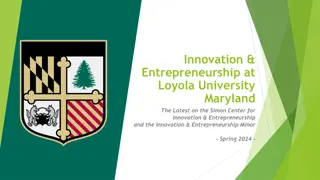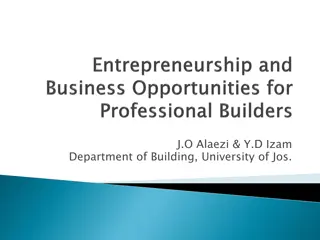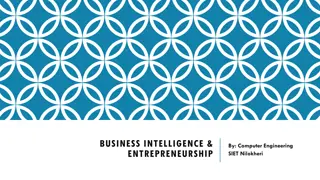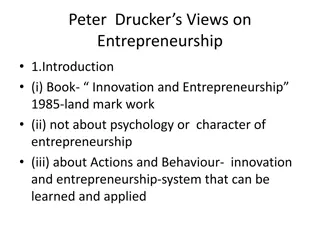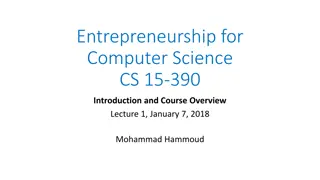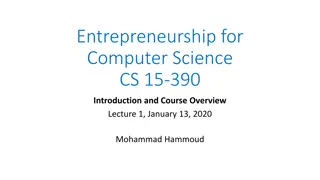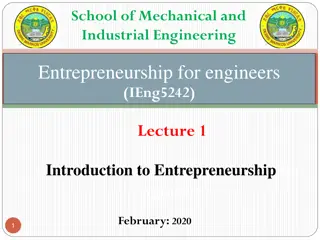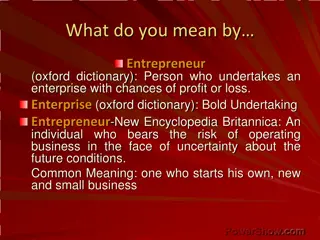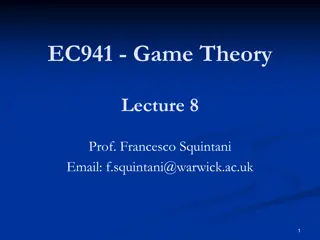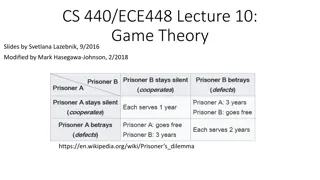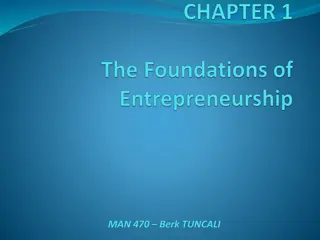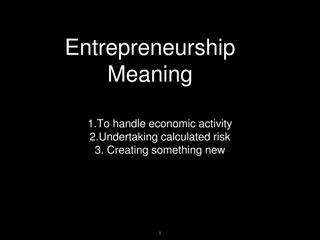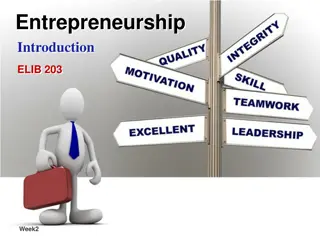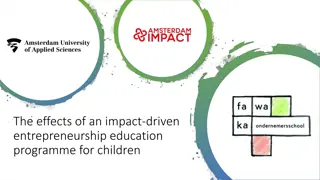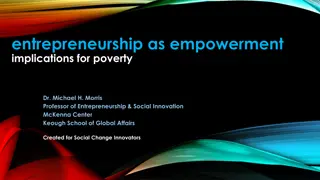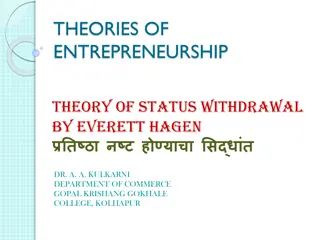Understanding Game Theory in Entrepreneurship - An Insightful Perspective
Delve into the intersections of game theory and entrepreneurial decision-making, exploring concepts like the Prisoner's Dilemma, Tragedy of the Commons, Public Goods, and the Depression Trap. Discover how entrepreneurship involves foresight, alertness, and the ability to change the game. Learn how to navigate strategic dilemmas and optimize outcomes in uncertain environments.
Download Presentation

Please find below an Image/Link to download the presentation.
The content on the website is provided AS IS for your information and personal use only. It may not be sold, licensed, or shared on other websites without obtaining consent from the author. Download presentation by click this link. If you encounter any issues during the download, it is possible that the publisher has removed the file from their server.
E N D
Presentation Transcript
Game Theory: An Entrepreneurial Twist Mises University 2023 Lucas M Engelhardt Bit.ly/prof_e
Rothbards View [Outside economics] the rest of praxeology is an unexplored area A theory of games has been elaborated Man, Economy, and State, Chapter 1, Appendix A
Prisoners Dilemma! Bonnie Confess Don t Confess Clyde Confess 5 yrs for each 0 yrs for Clyde 10 yrs for Bonnie 10 yrs for Clyde 0 yrs for Bonnie 2 yrs for each Don t Confess
Tragedy of the Commons Bonnie Use the Commons Don t Use Clyde Use the Commons Desolation! Useful for Clyde Useless for Bonnie Useless for Clyde Useful for Bonnie Pristine, useless wilderness Don t Use
Public Goods Bonnie Free Ride Fund Clyde Free Ride WHO WILL BUILD THE ROADS??? Clyde benefits Bonnie pays (> benefit) Fund Clyde pays (> benefit) Bonnie benefits Beautiful highways for all Costs split fairly (benefit > cost for all)
Depression Trap Bonnie Keep Wages Low Increase Wages Clyde Keep Wages Low Depression! Profit for Clyde Cost for Bonnie Increase Wages Cost for Clyde Profit for Bonnie Economic expansion!
Typical Conclusions In Prisoners Dilemmas People choose optimally individually People get bad outcomes socially Need government to: Force wages up in depressions Fund public goods with taxes Regulate use of the commons Keep prisoners from confessing (?)
Entrepreneurship Mises foresight Entrepreneurship is acting under uncertainty. A successful entrepreneur, then, has keen foresight. Kirzner alertness Entrepreneurship is seizing opportunities. A successful entrepreneur, then, is alert to opportunities that arise.
Prisoners Dilemma Redux Entrepreneurs don t just declare the game lost (that is, both confess.) Entrepreneurs change the game. Game theorists already know a number of solutions. Ex. Repetition changes the prisoners dilemma s outcome
Game Theory: Reenvisioned Key assumption: the game is fixed. With entrepreneurs, this is not true! Ask the right question: How might entrepreneurs try to improve the game? If they aren t why not? Maybe hidden costs. Maybe some rule preventing it.
Using Game Theory Wrong See previous examples Depressions and wages Commons and Public Goods Austrians are not immune! See Carilli & Dempster (2001)
Carilli & Dempster (2001) Business Cycle Investment All other Firms Increase Investment Maintain Investment Firm X Increase Investment Relative profits equal Boom/Bust Cycle Firm X profit > Other Firms profit Maintain Investment Firm X profit < Other firm profit Relative Profits equal No boom-bust
Whats wrong with C&D? Short term perspective Relative profit? Doesn t ask the right question: Why don t firms organize to prevent the increased investment which will hurt them all in the long run?
Using Game Theory right Game theory can inform when entrepreneurs will seek creative, institutional solutions to nasty problems.
Split or Steal Ibrahim Steal Split Nick Steal Zero for each 50K Nick 0 Ibrahim Split 0 for Nick 50K for Ibrahim 25K for each
Split or Steal Nicks Solution Ibrahim Steal Split 25K Nick 25K Ibrahim Nick Steal Zero for each Split 0 for Nick 50K for Ibrahim 25K for each
J. Huerta de Soto Credit Expansion (667) Bank B Does not expand Expands Bank A Does not expand Both survive Small profit BankA survives Bank B fails Expands Bank A fails Bank B survives Both survive Large profit
De Sotos Conclusion? Prudent bankers won t expand. Fear of failure Imprudent bankers would expand. All bankers have an incentive to coordinate credit expansion. Bankers push for central banks!
Credit Expansion with Bailouts Bank B Does not expand Expands Bank A Does not expand Both survive Small profit BankA survives Bank B gets bailed out (small profit) Expands Bank A gets bailed out (small profit) Bank B survives Both survive Large profit
Other Solutions Prisoners Dilemma Repeated games (partners in crime!) Enforcers (breaking confessors kneecaps) Tragedy of the commons Privatize them! Ostrom s work on Managing the Commons Public goods Matching funds (a la Kickstarter and Reading Rainbow)
Conclusions Game Theory the wrong way: We end up with lousy outcomes from individual choice. Eliminate individual choice. The right way: Lousy outcomes attract entrepreneurs. What are they doing to fix things? Why aren t they fixing certain issues?


